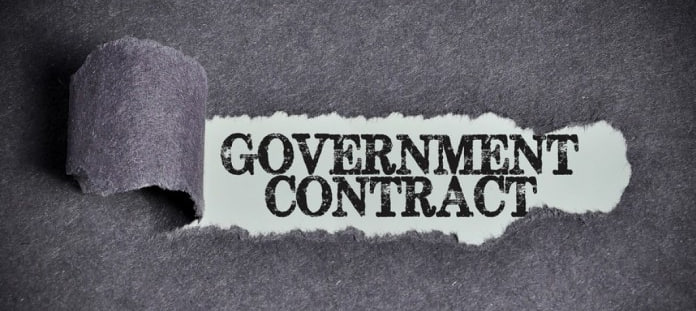Description

Copyright infringement not intended
Context: In a recent case, the Supreme Court of India has ruled that the government cannot invoke immunity from the legal provisions of a contract entered into under the name of the President, as per Article 299 of the Constitution. This article deals with the power and authority of contracts in India and lays down the conditions for their validity and enforceability.
Details
About
- Article 299 of the Constitution of India deals with the contracts made by the government of India or any of its states. It lays down the rules and procedures for making and executing such contracts, as well as the liability of the parties involved.
Article 299(1)
- Article 299(1) also states that all such contracts and all assurances of property made in the exercise of that power shall be executed on behalf of the President or the Governor by such persons and in such manner as he may direct or authorise.
- This means that the actual signing and delivery of the contracts must be done by someone who is authorised by the President or the Governor, and under their directions.
- This also means that the contracts must be made in the name of the head of the executive, and not in the name of any individual minister or officer.
- The purpose of this rule is to ensure that the contracts are made with due authority and responsibility and to avoid any confusion or dispute about their validity.
Article 299(2)
- Article 299(2) states that neither the President nor the Governor shall be personally liable in respect of any contract or assurance made or executed for this Constitution, or for any enactment relating to the Government of India heretofore in force, nor shall any person making or executing any such contract or assurance on behalf of any of them be personally liable in respect thereof.
- This means that the President or the Governor cannot be sued for breach of contract or damages arising out of any contract made by them in their official capacity. Similarly, any person who acts on their behalf cannot be held personally liable for any such contract.
- The purpose of this rule is to protect the dignity and immunity of the head of the executive and to ensure that any claim arising out of a contract made by them is directed against the government as a whole, and not against them individually
Supreme Court Observation
- The Supreme Court held that these provisions are mandatory and not directory, and any deviation from them would render the contract void and unenforceable.
- It held that the immunity granted to the President or the Governor under Article 299(2) does not extend to the government, which is bound by the terms and conditions of the contract.
- It observed that Article 299 is based on the principle of privity of contract, which means that only parties to a contract can sue or be sued on it.
- It noted that Article 299 is intended to protect the public interest and prevent unauthorised persons from entering into contracts on behalf of the government without proper sanction and authority.
Court Verdict
- The Court clarified that Article 299 does not preclude judicial review of contracts made by the government and that such contracts are subject to scrutiny on grounds of illegality, irrationality, procedural impropriety, mala fides, etc.
- The Court concluded that Article 299 is a constitutional safeguard for ensuring transparency, accountability and fairness in government contracts and that any attempt to evade or circumvent it would be contrary to public policy and good governance.
Important Case
- 1954 top court ruling in ‘Chatturbhuj Vithaldas Jasani v/s Moreshwar Parashram & Ors’, is that there must be a definite procedure according to which contracts must be made by agents acting on the government’s behalf; otherwise, public funds may be depleted by unauthorized or illegitimate contracts.
- In its latest judgement, the court referred to its 1966 ruling in ‘P. Chowdhry v/s State of Madhya Pradesh. And Others’, which laid down essential requirements for government contracts under Article 299. In that ruling, the top court had reiterated three conditions to be met before a binding contract against the government could arise, namely:
- The contract must be expressed to be made by the Governor or the Governor-General.
- It must be executed in writing.
- The execution should be by such persons and in such manner as the Governor or the Governor-General might direct or authorise.”
Conclusion
- Article 299 is an important provision that regulates the contractual relations between the government and other parties. It ensures that there is clarity, accountability and legality in such relations and that there is no scope for fraud, corruption or misuse of power. It also protects the interests and rights of both the government and the other contracting parties, by providing a mechanism for enforcing and resolving any disputes arising out of such contracts.

https://indianexpress.com/article/explained/explained-law/govt-immunity-contract-president-name-sc-8636329/











